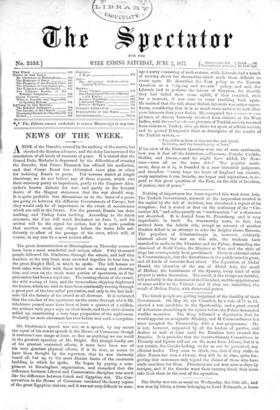Mr. Gladstone's speech was not, as a speech, by any
means the equal of his recent speech in the House of Commons, though it contained one image at least as fine as anything we can recall in the greatest speeches of Mr. Bright. But though hardly one of his greatest oratorical efforts, it must have been one of his very greatest physical efforts, if it be true, as seems to have been thought by the reporters, that he was distinctly heard all but up to the most distant limits of the enormous building in which he spoke. He began by paying a com- pliment to Birmingham organisation, and remarked that the difference between Liberal and Conservative discipline was much like the difference between Greek and Egyptian Art. The Con- servatives in the House of Commons emulated the heavy repose of the great Egyptian statues, and it was not very difficult to man- age a party consisting of such statues, while Liberals had a knack of moving about for themselves which made them difficult to count upon. Ile described the Tory policy on the Eastern Question as a " zig-zag and ace-saw " policy, and said the Liberals had to perform the labour of Sisyphus, for directly they had rolled their stone uphill, if they remitted, even for a moment, it was sure to come tumbling back again. He insisted that the talk about British interests was rather super- fluous, considering that it is so much more natural to look after your interests than your duties. He compared the couleur-de-rose pictures of slavery formerly received from visitors to the West Indies, with the coukur-de-rose pictures of Turkish society received from visitors to Turkey, who go there for sport or official service, and he quoted Tennyson's lines as descriptive of the results of the Turkish system,- " The childron born of thee are fire and sword,
Rol ruin, and the breaking-up of laws."
If his view of the Eastern Question were one of mere sentiment, how was it that all the historians,—Freeman, Froude, Carlyle, Stubbs, and Green,---and he might have added, Dr. New- man—were all on the same side ? The popular senti- ment, deep as it is, is founded in a sure historical judgment, and therefore "every hope the heart of England can cherish, every aspiration it can breathe, are hopes and aspirations, in re- gard to this great question of the East, on the side of freedom, of justice, and of peace."


































